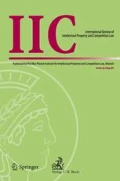-
1.
It can be deduced from Art. 1 of the Protocol on the interpretation of Art. 69(1) EPC that the scope of protection afforded to a patentee is not to be limited by the literal meaning of the claims. Moreover, according to Art. 2, there is a difference between interpreting a claim and the extent of protection afforded by a claim. When considering the extent of such protection, equivalents must be taken into account.
-
2.
A problem of infringement is best approached by addressing two issues, each of which is to be considered through the eyes of the person skilled in the relevant art:
-
Whether the variant infringes any of the claims as a matter of normal interpretation;
-
And, if not, whether the variant nonetheless infringes because it varies from the invention in an immaterial manner.
-
If the answer to either issue is affirmative, then there is infringement. Otherwise, there is not.
-
-
3.
In determining what constitutes an “immaterial” variation required by the second question above, the following three questions should be considered:
-
Notwithstanding that it is not within the literal meaning of the relevant claim(s) of the patent, does the variant achieve substantially the same result in substantially the same way as the invention, i.e. the inventive concept revealed by the patent?
-
Would it be obvious to the person skilled in the art, reading the patent at the priority date, but knowing that the variant achieves substantially the same result as the invention, that it does so in substantially the same way as the invention?
-
Would such a reader of the patent have concluded that the patentee nonetheless intended that strict compliance with the literal meaning of the relevant claim(s) of the patent was an essential requirement of the invention?
-
In order to establish infringement in a case where there is no literal infringement, a patentee would have to establish that the answer to the first two questions was affirmative and to the last was negative.
-
-
4.
In the light of the wording of Art. 69 EPC 2000, the circumstances in which a court can rely on the prosecution history to determine the extent of protection or scope of a patent must be limited. Reference to the file would only be appropriate where either:
-
The point at issue is truly unclear when one confines oneself to the specification and claims of the patent, and the contents of the file unambiguously resolve the point, or;
-
It would be contrary to the public interest for the contents of the file to be ignored.
-
Author information
Consortia
Additional information
Available at http://www.supremecourt.uk.
Rights and permissions
About this article
Cite this article
Actavis UK Limited and others v. Eli Lilly and Company; Eli Lilly and Company v. Actavis UK Limited and others Protocol on the Interpretation of Article 69(1) EPC, Art. 1; European Patent Convention, Art. 69. “Actavis v. Lilly – Pemetrexed”. IIC 49, 104–105 (2018). https://doi.org/10.1007/s40319-017-0665-z
Published:
Issue Date:
DOI: https://doi.org/10.1007/s40319-017-0665-z

